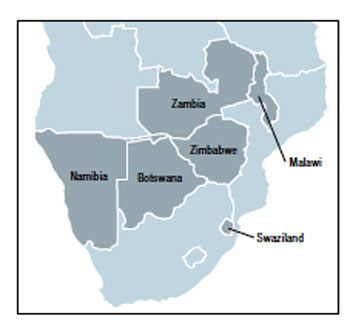Anti-AIDS programs ignore LGBTs in Africa
Colin Stewart is a 45-year journalism veteran living in Southern…

While the LGBT community globally struggles to find funds for basic human services and HIV prevention, we are discovering disturbing trends in the allocation of United States funds to Christian fundamentalist organizations that are often in the front lines of encouraging the further criminalization of homosexuality.
My recent visit to Uganda uncovered a disturbing trend among religious NGOs (non-governmental organizations) that have agreed to serve the populations that are vulnerable to HIV infection, including LGBT and men who have sex with men (MSM).
These NGOs signed contracts with the U.S. government to serve them, but then they use different definitions for vulnerable populations, excluding LGBT and MSM. There is no recourse when these contracts are not fulfilled.
A recent report from amfAR shows how much the same problem is affecting eight southern African countries (Botswana, Malawi, Namibia, Swaziland, Zambia, and Zimbabwe). The problem may be systemic in many of the countries we are supporting with PEPFAR and USAID funds, including Uganda.
LGBT Ugandans are currently excluded from receiving PEPFAR and USAID funding at any significant level to meet their needs.
* * *

The amfAR report found that, although LGBT people are at high risk of HIV infection, most PEPFAR program budgets “contained few dedicated funds” for them and “only 0.07 percent of all Global Fund resources for HIV were targeted to them.”
The amfAR press release about its report states:
Today amfAR, The Foundation for AIDS Research and the Center for Public Health and Human Rights (CPHHR) at The Johns Hopkins University jointly released a new report that provides the first ever comprehensive analysis of the financing and implementation of HIV programs for gay men, other men who have sex with men (MSM) and transgender individuals in six countries. …
It emphasizes the role stigma and discrimination play in undermining the fight against HIV in the region.
In particular, the report highlights the negligible amount of funding provided by the two largest sources of international donor support for HIV: the US President’s Emergency Plan for AIDS Relief (PEPFAR) and The Global Fund to Fight AIDS, Tuberculosis and Malaria. Despite clear policy commitments and recent progress in addressing the epidemic among this population, as of 2012 the majority of PEPFAR budgets contained few dedicated funds for these groups and only 0.07 percent of all Global Fund resources for HIV were targeted to them.
“This report shines a much-needed spotlight on the neglect of a population that is particularly vulnerable to HIV,” said amfAR CEO Kevin Robert Frost. “If we want to effectively combat the HIV epidemic in this region, we must implement programs that address stigma and discrimination.”
“For years it was asserted that gay men and transgender people didn’t exist in Southern Africa, but that’s simply not true,” said Owen Ryan, amfAR’s deputy director of public policy and a lead author of the report. “International donors have taken far too long to recognize and respond to HIV among these men and women.”
The recommendations of the amfAR report include:
- National governments should decriminalize same-sex sexual practices and support programs that reduce stigma and discrimination against marginalized groups.
- PEPFAR should institute clearer budgeting and reporting practices that make the implementation of national strategic plans and the allocation of resources more transparent.
- The Global Fund should help countries reprogram existing grants to address the needs of GMT [gays, men who have sex with men, and transgender people] in the region and institute stronger accountability mechanisms to ensure that approved programs are actually implemented.
- UNAIDS should improve the quality and scope of technical assistance it provides countries by increasing the number of staff with expert knowledge of issues related to key populations, particularly GMT.
- All countries receiving international assistance for HIV should conduct biennial epidemiological surveillance that includes key populations, especially GMT.
Related articles
- 4 missteps that let AIDS continue to spread (76crimes.com)
- PEPFAR budget cuts cause anxiety (IRINnews.org)
- Kerry: Africans’ Access to U.S.-Funded AIDS Drugs Is ‘Breathtaking Accomplishment’ (cnsnews.com)
- 10 Things You Need to Know About PEPFAR on its 10th Anniversary (one.org)
- The challenges of addressing HIV for gay Africans (one.org)
- An analysis of the implementation of PEPFAR’s anti-prostitution pledge and its implications for successful HIV prevention among organizations working with sex workers (sexworkresearch.wordpress.com)
- John Kerry Visit and the misuse of PEPFAR funding for Hatred against LGBTI Community in Ethiopia (rainbowethiopia1.wordpress.com)


